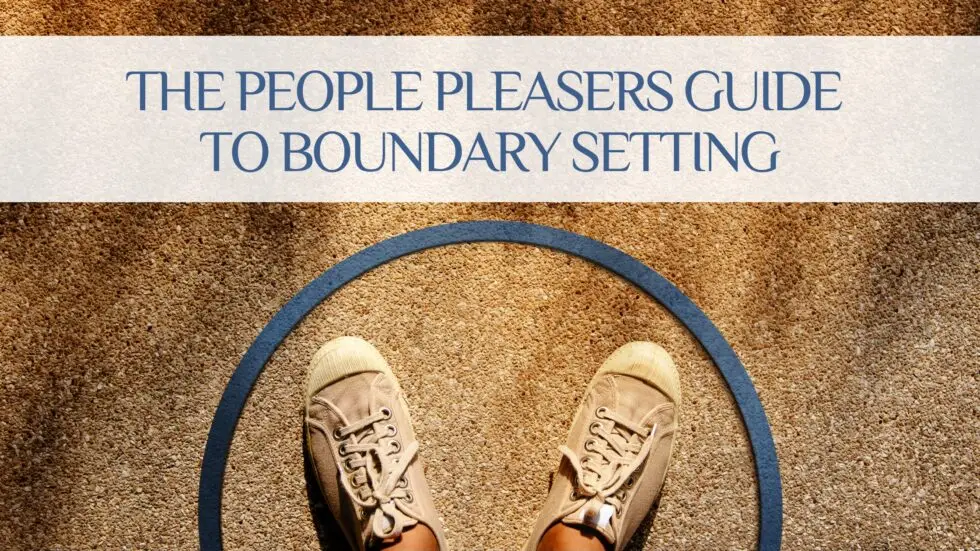Do you feel like you’re on a never-ending hamster wheel of saying “yes” to everyone but yourself? For people pleasers, the struggle is real—you’re constantly juggling work, relationships, and favors, all while your own needs get pushed to the back burner. The result? Overwhelm, anxiety, and maybe even a nagging sense of resentment you can’t quite shake.
But here’s the good news: life doesn’t have to feel this way. The secret to breaking free from this cycle lies in something deceptively simple yet profoundly life-changing—setting healthy boundaries.
This blog is your step-by-step guide to reclaiming your time, energy, and emotional well-being. Packed with practical advice and encouragement, it’s everything you need to start putting yourself first (without the guilt!). Read on to learn how small changes can transform not just your mental health but your entire outlook on life.
WHY PEOPLE PLEASERS OFTEN NEED BOUNDARIES
Look, wanting to make people happy is a beautiful thing! People pleasing may feel noble—it’s natural to want to make others happy—but it often comes at a steep personal cost. People-pleasing sneaks up on you, convincing you it’s noble or kind to always be available, but the reality is…it’s exhausting. Constantly bending over backward for others can leave you feeling drained, resentful, and honestly, just kind of over it all.
When your boundaries are repeatedly ignored (sometimes even by your own doing), several issues arise:

-
- Burnout from overcommitting to work or social obligations.
-
- Resentment towards others, even though you said “yes” by choice.
-
- Anxiety about whether you’re doing enough or being “good enough.” Spoiler alert: You are.
-
- Low self-esteem, as your own needs always seem less important than those of others.
Do any of those sound painfully familiar? It’s ok—they happen to the best of us. But setting boundaries can change all of that (and yes, you can do it even if you hate conflict—that’s the dream, right?).
SIGNS IT’S TIME TO SET BOUDARIES
How do you know if your mental health is taking a hit and boundaries are desperately needed? Here are some red flags to watch for:
1. You feel constantly overwhelmed or stressed because you’ve committed to way too much.
2. You’re afraid of saying no, even when an offer or request feels unreasonable.
3. Your relationships feel one-sided, with you always giving and rarely receiving.
4. You experience guilt for prioritizing your own needs, no matter how minor.
5. You notice physical signs of stress, such as trouble sleeping, frequent headaches, or fatigue.
6. “Me time” is non-existent, and even small self-care activities make you feel selfish.
If any of that made you think “yep, that’s me,” —you’ve just identified the first step towards change.
HOW TO SET BOUNDARIES (WITHOUT THE GUILT)
If the idea of setting boundaries makes you feel queasy, you’re not alone. Most people pleasers worry about hurting someone’s feelings or causing conflict. But setting boundaries is less about “keeping people out” and more about letting yourself in. The goal is to create space for peace, balance, and maybe even a little joy. Here’s how to start:
1. Understand Your Needs
Start by identifying what drains you emotionally, mentally, or physically. Do your coworkers frequently ask you to take on extra tasks? Are friends expecting too much of your time? Pinpointing these areas helps you decide where boundaries are most needed.
2. Learn to Say No (and Mean It)
No doesn’t have to be mean or rude. It can actually be polite, kind, and firm. Try these:
-
- “Thanks for thinking of me, but I’m not available right now.”
-
- “I appreciate you asking, but that’s not something I can take on.”
-
- “Thanks so much for asking! I can’t help this time.”
-
- “I’d love to, but I’ve got too much on my plate right now.”

3. Communicate Clearly and Directly
When setting boundaries, be assertive but kind. Clearly express your limits without leaving room for misinterpretation. For example:
-
- “I need to step away from work emails after 6 PM to recharge.”
-
- “While I’d love to help, I need to focus on my own projects this week.”
-
- “I can’t make it this weekend, but I hope you have a great time!”
Being direct isn’t mean—it’s respectful to both you and the person you’re speaking with.

4. Be Consistent
Here’s the tricky part—boundaries only work if you stick to them. If you start making exceptions too often, people might think your limits are, well, optional. Consistency reinforces your boundaries, and over time, others will adapt.
5. Use Professional Help When Needed
If boundary-setting feels impossible or if you’re dealing with particularly tricky relationships (like your boss or a family member), a counselor or coach can be a game-changing ally. Pro tip: Renewed Wellness Counseling is fantastic if you’re looking for support.
DEALING WITH GUILT AND FEAR
It’s normal to feel guilt or fear when setting boundaries—especially for people pleasers. You might even feel like you’re doing something “wrong.” But here’s your reminder that setting boundaries isn’t selfish—it’s self-care. Here are a few ways to handle any negative feelings that pop up:
-
- Focus on the Bigger Picture: Remind yourself that boundaries lead to better mental health, which ultimately benefits everyone around you.
-
- Use Affirmations: Repeat mantras like “Taking care of myself helps me show up better for others.”
-
- Prepare for Reactions: True friends and supportive colleagues will understand your boundaries. If someone reacts negatively, it’s a reflection of them, not you.
-
- Celebrate Your Wins: Even small steps deserve a victory dance.

PRIORITIZING SELF-CARE AND COMPASSION
When you prioritize rest and self-care, sticking to boundaries becomes far more manageable. You’ll approach challenges with greater clarity and resilience, whether it’s addressing a difficult colleague or managing feelings of guilt.
The ability to set boundaries starts with a foundation of self-care and self-compassion. Remember:
-
- Self-care is not a luxury; it’s a necessity. Make time for activities that recharge your spirit.
-
- Treat yourself with kindness and patience. Learning to say “no” takes practice, and stumbling along the way doesn’t mean failure.
CREATE A HEALTHIER, HAPPIER YOU
Remember, boundaries are a form of self-respect and a crucial part of maintaining mental health. It might feel uncomfortable at first, but each small step you take is a powerful act of reclaiming your time, energy, and peace of mind.
You deserve connections and experiences that uplift and sustain you, not ones that leave you drained. Start small, be patient with yourself, and know that you’re building a stronger, more self-assured version of you. You’ve got this—and you’re absolutely worth it.

HELP IS AVAILABLE AT RENEWED WELLNESS COUNSELING
If you’re ready to take the next step in boundary-setting, Renewed Wellness Counseling can help. Our expert counselors are here to guide you through the process, offering tailored advice to suit your unique challenges.








